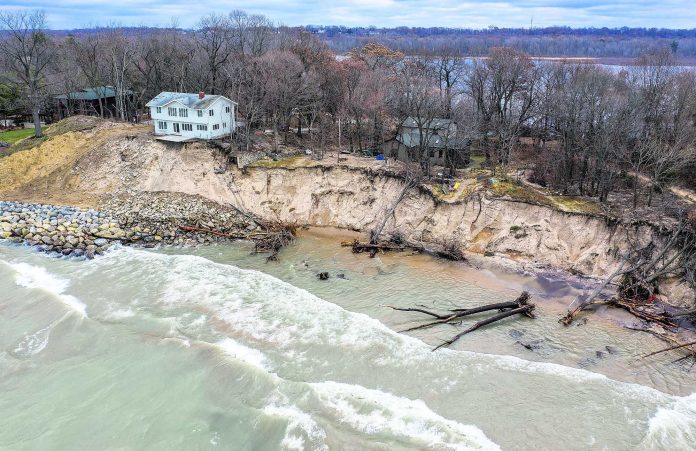
By JOHN FLESHER
AP Environmental Writer
TRAVERSE CITY, Mich. (AP) — Shoreline cities and towns in the Great Lakes region will be spending heavily in coming years to fix public infrastructure damaged by recent flooding and erosion, with estimated costs approaching $2 billion, officials said Thursday.
Communities already have poured about $878 million into repairs over the last two years, according to the results of a survey by the Great Lakes and St. Lawrence Cities Initiative, a coalition of mayors and local officials in the region’s eight states and two Canadian provinces.
But the survey of 241 cities, villages and other jurisdictions found that at least $1.94 billion more will be needed over the next five years. The total is certain to be even higher because the report didn’t include all shoreline municipalities, said Jon Altenberg, the initiative’s executive director.
“Communities around the Great Lakes face a growing crisis, and we need both the federal governments of the U.S. and Canada to assist with the necessary investments,” Milwaukee Mayor Tom Barrett said. “Our coastal infrastructure is vital to the economic and recreational health of our communities, and coordinated action is required.”
Abnormally high lake levels and severe rains since 2019 have hammered drinking water intake pipes, sidewalks, ports and docks. Parkland, beaches and wetlands have washed away. Portions of roads have crumbled.
Great Lakes levels fluctuate annually with the seasons and historically experience prolonged high- and low-water periods. But scientists say the warming climate may be making those multi-year swings more abrupt and extreme.
Lakes Huron and Michigan reached their lowest levels on record in early 2013, while the other Great Lakes — Superior, Erie and Ontario — were well below average. Then came a turnabout, as wetter weather filled the lakes to the brim. All five set record highs during the past two years.
Although levels have dipped this year, intense storms have brought flooding to some cities on the lakes or rivers connecting them, including Chicago and Detroit.
The cities group is joining other government, business and environmental organizations in pushing for the Great Lakes region to get a generous share of the infrastructure funding proposed by President Joe Biden and under consideration in Congress.
In addition to continued funding of the Great Lakes Restoration Initiative cleanup program established in 2010, the groups in a June 24 letter to congressional leaders requested billions for water and sewer upgrades, flood prevention and related needs.
“These investments will address longstanding basin-wide priorities while stimulating economic activity in hard-hit communities throughout our region,” the letter said.
















